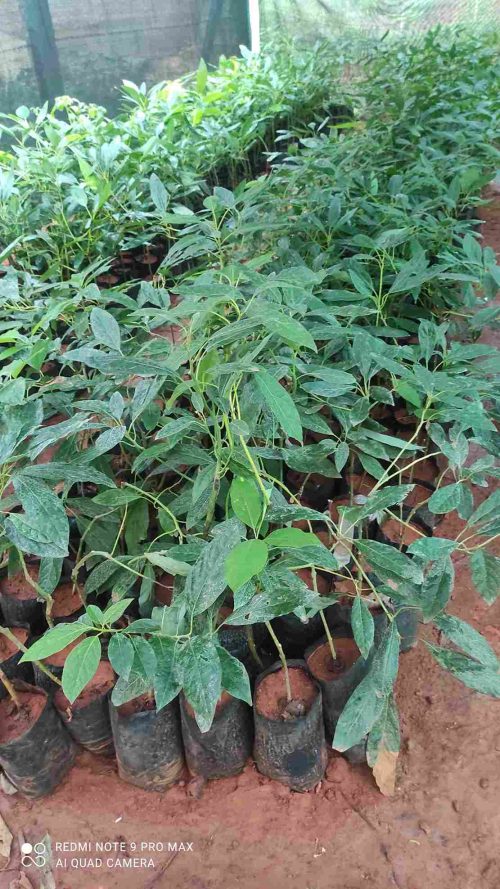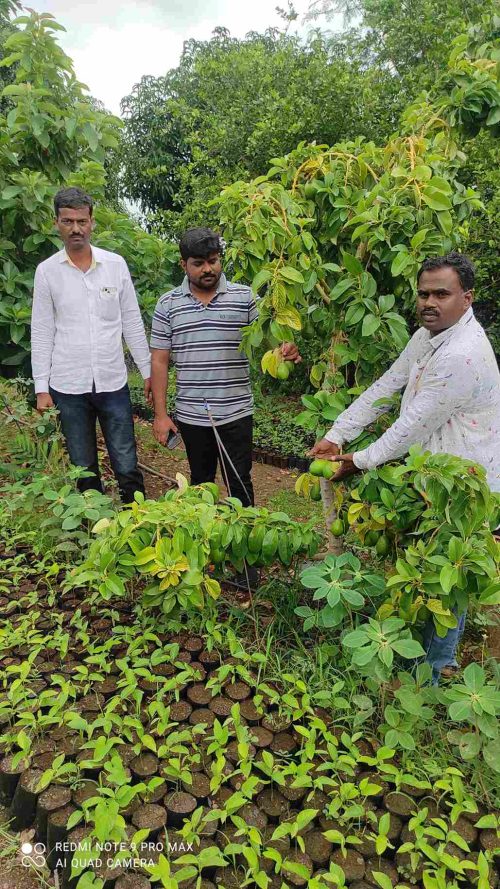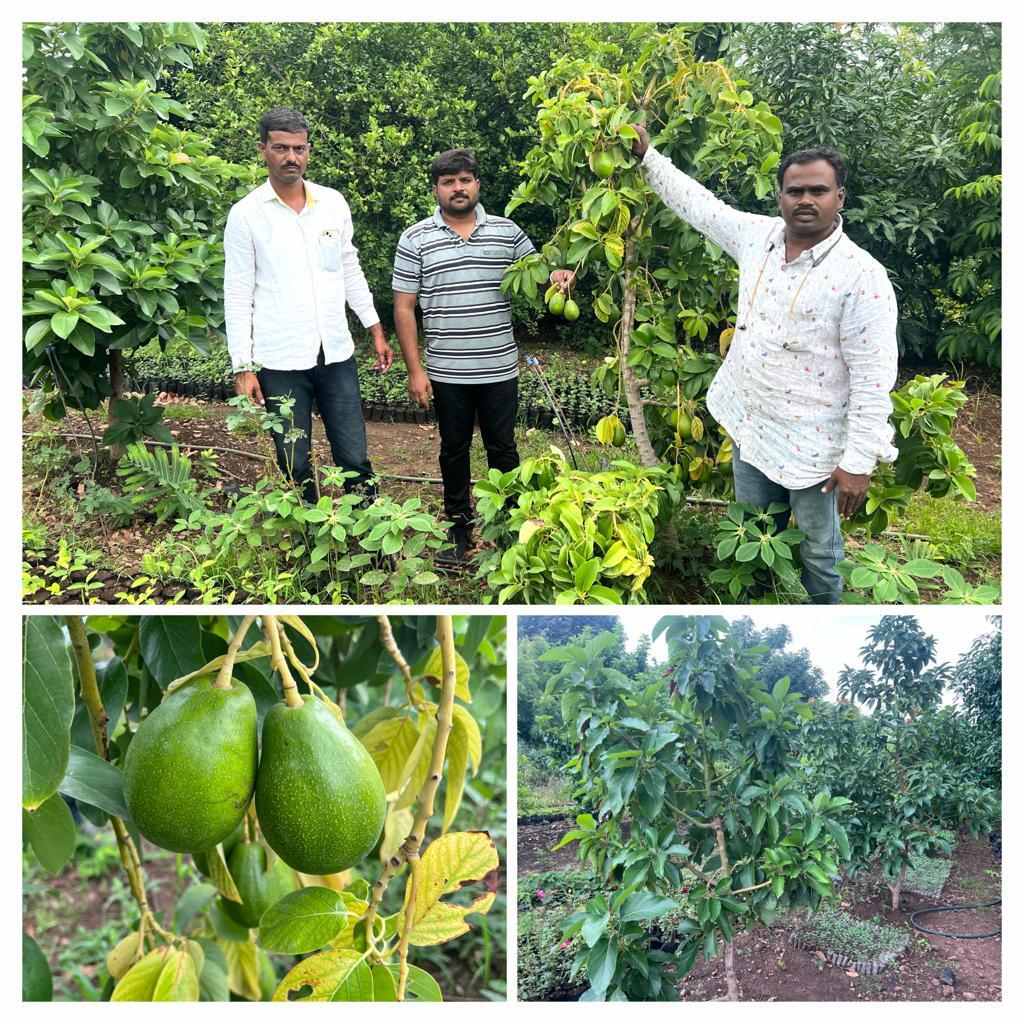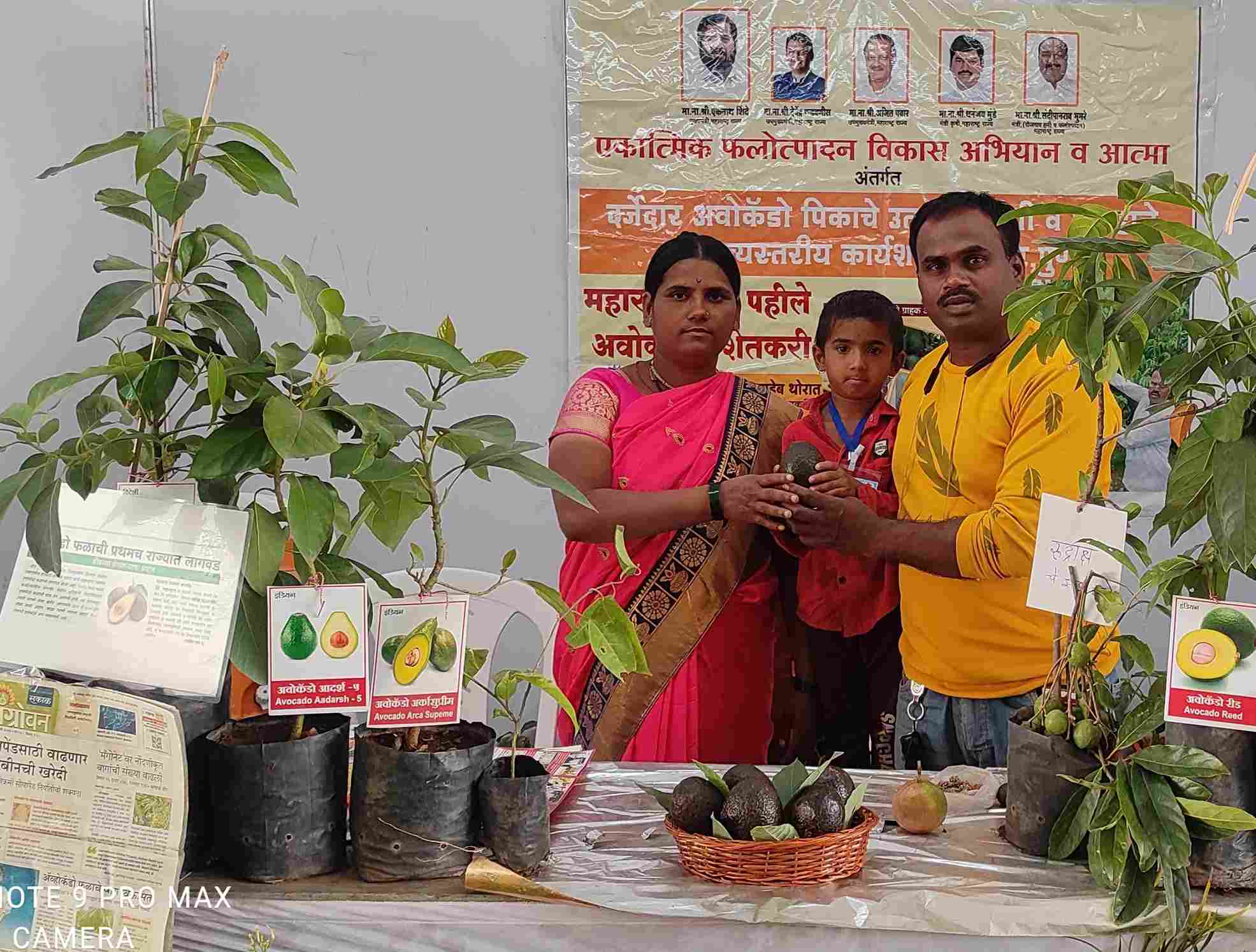Beed, situated in the heart of Marathwada, Maharashtra, faces significant challenges due to its arid landscape and ongoing water scarcity. With insufficient rainfall and a declining water table, agriculture in the region is a constant struggle, particularly for crops that require abundant water.
Amid these difficulties, Parmeshwar Thorat has defied the odds by becoming a pioneer in avocado farming. “I wanted to move away from traditional crops (like ) and try something unique and innovative — something no one else was doing in Beed,” Parmeshwar tells The Better India.
This desire led him to explore the untapped potential of avocado farming.
Avocado, a fruit celebrated for its nutritious value, was relatively unknown in the Marathwada region. Its growing demand stems from its benefits for , diabetes, and heart health. “I delved deep into research about the fruit and its advantages. I realised it could be a game-changer not just for my family but for the entire community,” he explains.
The avocado has come to symbolise Parmeshwar’s dedication, adaptability, and entrepreneurial spirit. A man of humble beginnings with ambitious dreams, his journey is a tale of perseverance and sustainable farming — demonstrating that even in one of India’s harshest agricultural environments, innovation can thrive.
Parmeshwar, who comes from a family of farmers, grew up immersed in the rhythms of rural life. Agriculture became his way of honouring his family’s legacy. “I always wanted to follow in my father’s footsteps — not just to carry on the family tradition, but to support him in his work,” he shares.
After earning a diploma in agriculture, his path became clear. He pursued the course to enhance his skills and deepen his understanding of farming.
The turning point came when he started considering the future of agriculture in his region. He realised that to make a meaningful impact, he needed to innovate and focus on sustainable crops that could thrive in the region’s challenging environment.

Parmeshwar Thorat started his journey by planting 50 avocado saplings
The idea for avocado farming first took root in 2018 when Parmeshwar visited South India. During a trip to Bengaluru, he met several farmers and learned about a unique variety of called Arka Supreme. This variety caught his attention because it could adapt to Maharashtra’s hot climate, thriving even in temperatures as high as 40 to 45 degrees Celsius — perfect for Beed’s environment. “Arka Supreme is a high-yielding variety, and I knew it would work here,” he says confidently.
In his quest for knowledge, Parmeshwar visited the ICAR-Indian Institute of Horticultural Research (IIHR) in Bengaluru to learn more about avocado cultivation. There, he acquired valuable insights into farming practices. Equipped with this newfound knowledge, he ordered 50 avocado saplings from Karnataka.
However, starting avocado farming in Beed was far from easy. The region being notorious for its extreme temperatures and chronic water scarcity, the challenges initially seemed insurmountable for cultivating avocados. “There was very little knowledge about avocado farming here, and no one had attempted it before,” Parmeshwar recalls.
“To overcome these challenges, the first thing I did was dig two feet by two feet pits across 0.75 acres of land,” he explains. “I filled them with cow dung manure before planting the saplings. I knew the soil needed enrichment to supply the nutrients the plants required.”
Next, he installed a drip irrigation system to ensure the saplings received adequate water without wastage. “Drip irrigation takes water and other nutrients directly to the roots, minimising wastage,” he says.
Parmeshwar also utilised a pond on his farm to capture rainwater runoff. The stored water is used during the dry months of March and April, reducing reliance on groundwater. “We collect as much rainwater as possible during the monsoon and use it during the dry seasons. It helps keep the farm sustainable,” he explains.
This careful planning bore fruit when the first avocados were harvested in 2021.
In the beginning, no one in Beed believed that avocado farming could succeed. But Parmeshwar’s perseverance paid off. By 2021, his 50 plants began to produce fruits!

Parmeshwar uses cow dung manure and natural farming methods to keep his produce healthy
And by 2022, he sold his first batch for Rs 200 per fruit, earning a profit of Rs 3 lakh. “At first, people didn’t know much about avocados in my region, but after I distributed samples, they became curious. Slowly, the demand started building,” he recalls with a smile.
One of the key factors behind Parmeshwar’s success is his commitment to . “Avocados are a healthy fruit, and I want to keep them that way. Initially, I used chemical fertilisers and pesticides, but after learning about organic farming, I changed my techniques,” he explains.
Parmeshwar’s use of cow dung manure and natural farming methods not only ensures the health of the plants but also appeals to consumers who are becoming more aware of the benefits of organic produce.
Sister Annie, an advocate of sustainable agriculture, has been a witness to his transformation. “We visited Parmeshwar’s farm and observed his avocado cultivation practices. After recommending a switch to organic farming, the results were remarkable. The yield improved significantly, the taste of the fruit enhanced, and they stayed fresh for a week without refrigeration,” she claims.
Parmeshwar significantly increased his profits by incorporating grafting techniques into his farming approach. “Grafting helps extend the lifespan of the plants, which will benefit future generations of farmers,” he explains.

Today, Parmeshwar’s farm houses 300 avocado trees
Grafting involves joining the roots of one plant (known as rootstock) with the shoot or sapling of another (called the scion). He sources the rootstock from Tamil Nadu and uses scions from his existing plants. This technique not only improves the health of the plants but also enhances their yield, he informs.
Grafting costs around Rs 100 per sapling, and in 2022, Parmeshwar grafted around 250 new saplings. These plants are expected to start fruiting in the coming year. “Grafting is a game-changer,” he explains. “It extends the lifespan of avocado plants and boosts their yield potential.”
Krishna, a 62-year-old retired postal employee from Karnataka, played a crucial role in supporting Parmeshwar by supplying avocado plants for his farm. “Though I come from a non-farming background, we both began this journey of avocado farming together,” he says.
“When Parmeshwar visited Karnataka to learn about avocado cultivation, he didn’t speak Kannada and that’s how we met. I explained everything to him. His perseverance and dedication were clear, and over time, they helped him become a successful avocado farmer,” he shares.
“The avocado saplings I planted have yet to bear fruit. In contrast, Parmeshwar’s farm is thriving, and he’s now successfully harvesting avocados!” he remarks.
Parmeshwar’s journey into avocado farming is a , resilience, and sustainable practices. What started with just 50 saplings on a small plot of land has now blossomed into a thriving 1.75-acre farm — home to 300 avocado trees.
He says, “In 2023, I harvested and sold around 1,200 kg of avocados, earning a profit of Rs 5-6 lakh after selling each fruit at Rs 200.” He mentions that maintaining the farm costs him about Rs 50,000 annually.
In addition to selling the fruit, he has also ventured into selling avocado saplings. In 2023, he sold 2,300 saplings at Rs 300 each. After accounting for the cost of Rs 100 per sapling, he claims to have made a net profit of Rs 4.6 lakh from sapling sales. In total, his net profit for the year 2023 was approximately Rs 10 lakh per acre.

Parmeshwar’s produce is sold via local markets in Beed and Pune
Looking ahead, Parmeshwar is determined to expand his business. “I plan to supply my avocados to markets in Delhi and Mumbai next year, while continuing to sell in Beed and Pune,” he says.
Equally passionate about educating others, he adds, “I want to teach farmers how to grow avocados in drought-prone areas using drip irrigation and organic methods.” Many farmers have already visited his farm to learn from his experience, and he is eager to share his knowledge.
Parmeshwar advises other farmers, “If you want to earn profits and contribute to the community, consider starting avocado farming. It’s not just about growing a profitable crop; it’s about cultivating something that is healthy and beneficial for people.”
He also emphasises the importance of adaptability and perseverance: “Farming is not easy. There will always be challenges, but with determination and a willingness to learn, you can overcome anything.”
If you wish to buy the avocados, you can reach Parmeshwar at 7875185032.
Edited by Pranita Bhat; All photos courtesy Parmeshwar Thorat
Amid these difficulties, Parmeshwar Thorat has defied the odds by becoming a pioneer in avocado farming. “I wanted to move away from traditional crops (like ) and try something unique and innovative — something no one else was doing in Beed,” Parmeshwar tells The Better India.
This desire led him to explore the untapped potential of avocado farming.
Avocado, a fruit celebrated for its nutritious value, was relatively unknown in the Marathwada region. Its growing demand stems from its benefits for , diabetes, and heart health. “I delved deep into research about the fruit and its advantages. I realised it could be a game-changer not just for my family but for the entire community,” he explains.
The avocado has come to symbolise Parmeshwar’s dedication, adaptability, and entrepreneurial spirit. A man of humble beginnings with ambitious dreams, his journey is a tale of perseverance and sustainable farming — demonstrating that even in one of India’s harshest agricultural environments, innovation can thrive.
Avocado farming in challenging conditions
Parmeshwar, who comes from a family of farmers, grew up immersed in the rhythms of rural life. Agriculture became his way of honouring his family’s legacy. “I always wanted to follow in my father’s footsteps — not just to carry on the family tradition, but to support him in his work,” he shares.
After earning a diploma in agriculture, his path became clear. He pursued the course to enhance his skills and deepen his understanding of farming.
The turning point came when he started considering the future of agriculture in his region. He realised that to make a meaningful impact, he needed to innovate and focus on sustainable crops that could thrive in the region’s challenging environment.

Parmeshwar Thorat started his journey by planting 50 avocado saplings
The idea for avocado farming first took root in 2018 when Parmeshwar visited South India. During a trip to Bengaluru, he met several farmers and learned about a unique variety of called Arka Supreme. This variety caught his attention because it could adapt to Maharashtra’s hot climate, thriving even in temperatures as high as 40 to 45 degrees Celsius — perfect for Beed’s environment. “Arka Supreme is a high-yielding variety, and I knew it would work here,” he says confidently.
In his quest for knowledge, Parmeshwar visited the ICAR-Indian Institute of Horticultural Research (IIHR) in Bengaluru to learn more about avocado cultivation. There, he acquired valuable insights into farming practices. Equipped with this newfound knowledge, he ordered 50 avocado saplings from Karnataka.
However, starting avocado farming in Beed was far from easy. The region being notorious for its extreme temperatures and chronic water scarcity, the challenges initially seemed insurmountable for cultivating avocados. “There was very little knowledge about avocado farming here, and no one had attempted it before,” Parmeshwar recalls.
“To overcome these challenges, the first thing I did was dig two feet by two feet pits across 0.75 acres of land,” he explains. “I filled them with cow dung manure before planting the saplings. I knew the soil needed enrichment to supply the nutrients the plants required.”
Next, he installed a drip irrigation system to ensure the saplings received adequate water without wastage. “Drip irrigation takes water and other nutrients directly to the roots, minimising wastage,” he says.
Parmeshwar also utilised a pond on his farm to capture rainwater runoff. The stored water is used during the dry months of March and April, reducing reliance on groundwater. “We collect as much rainwater as possible during the monsoon and use it during the dry seasons. It helps keep the farm sustainable,” he explains.
This careful planning bore fruit when the first avocados were harvested in 2021.
From doubt to demand: Building a market for avocados
In the beginning, no one in Beed believed that avocado farming could succeed. But Parmeshwar’s perseverance paid off. By 2021, his 50 plants began to produce fruits!

Parmeshwar uses cow dung manure and natural farming methods to keep his produce healthy
And by 2022, he sold his first batch for Rs 200 per fruit, earning a profit of Rs 3 lakh. “At first, people didn’t know much about avocados in my region, but after I distributed samples, they became curious. Slowly, the demand started building,” he recalls with a smile.
One of the key factors behind Parmeshwar’s success is his commitment to . “Avocados are a healthy fruit, and I want to keep them that way. Initially, I used chemical fertilisers and pesticides, but after learning about organic farming, I changed my techniques,” he explains.
Parmeshwar’s use of cow dung manure and natural farming methods not only ensures the health of the plants but also appeals to consumers who are becoming more aware of the benefits of organic produce.
Sister Annie, an advocate of sustainable agriculture, has been a witness to his transformation. “We visited Parmeshwar’s farm and observed his avocado cultivation practices. After recommending a switch to organic farming, the results were remarkable. The yield improved significantly, the taste of the fruit enhanced, and they stayed fresh for a week without refrigeration,” she claims.
Parmeshwar significantly increased his profits by incorporating grafting techniques into his farming approach. “Grafting helps extend the lifespan of the plants, which will benefit future generations of farmers,” he explains.

Today, Parmeshwar’s farm houses 300 avocado trees
Grafting involves joining the roots of one plant (known as rootstock) with the shoot or sapling of another (called the scion). He sources the rootstock from Tamil Nadu and uses scions from his existing plants. This technique not only improves the health of the plants but also enhances their yield, he informs.
Grafting costs around Rs 100 per sapling, and in 2022, Parmeshwar grafted around 250 new saplings. These plants are expected to start fruiting in the coming year. “Grafting is a game-changer,” he explains. “It extends the lifespan of avocado plants and boosts their yield potential.”
Krishna, a 62-year-old retired postal employee from Karnataka, played a crucial role in supporting Parmeshwar by supplying avocado plants for his farm. “Though I come from a non-farming background, we both began this journey of avocado farming together,” he says.
“When Parmeshwar visited Karnataka to learn about avocado cultivation, he didn’t speak Kannada and that’s how we met. I explained everything to him. His perseverance and dedication were clear, and over time, they helped him become a successful avocado farmer,” he shares.
“The avocado saplings I planted have yet to bear fruit. In contrast, Parmeshwar’s farm is thriving, and he’s now successfully harvesting avocados!” he remarks.
Leading by example: Educating the next generation farmers
Parmeshwar’s journey into avocado farming is a , resilience, and sustainable practices. What started with just 50 saplings on a small plot of land has now blossomed into a thriving 1.75-acre farm — home to 300 avocado trees.
He says, “In 2023, I harvested and sold around 1,200 kg of avocados, earning a profit of Rs 5-6 lakh after selling each fruit at Rs 200.” He mentions that maintaining the farm costs him about Rs 50,000 annually.
In addition to selling the fruit, he has also ventured into selling avocado saplings. In 2023, he sold 2,300 saplings at Rs 300 each. After accounting for the cost of Rs 100 per sapling, he claims to have made a net profit of Rs 4.6 lakh from sapling sales. In total, his net profit for the year 2023 was approximately Rs 10 lakh per acre.

Parmeshwar’s produce is sold via local markets in Beed and Pune
Looking ahead, Parmeshwar is determined to expand his business. “I plan to supply my avocados to markets in Delhi and Mumbai next year, while continuing to sell in Beed and Pune,” he says.
Equally passionate about educating others, he adds, “I want to teach farmers how to grow avocados in drought-prone areas using drip irrigation and organic methods.” Many farmers have already visited his farm to learn from his experience, and he is eager to share his knowledge.
Parmeshwar advises other farmers, “If you want to earn profits and contribute to the community, consider starting avocado farming. It’s not just about growing a profitable crop; it’s about cultivating something that is healthy and beneficial for people.”
He also emphasises the importance of adaptability and perseverance: “Farming is not easy. There will always be challenges, but with determination and a willingness to learn, you can overcome anything.”
If you wish to buy the avocados, you can reach Parmeshwar at 7875185032.
Edited by Pranita Bhat; All photos courtesy Parmeshwar Thorat
